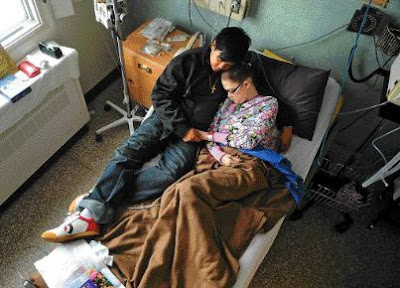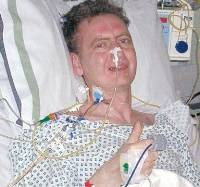The organs of nearly 700 British donors have been given to foreign patients, new figures reveal.By Patrick Sawer Telegraph.co.uk.The controversial practice has seen patients from as far afield as China fly in for operations at NHS hospitals around the country.
The procedures have taken place despite a severe shortage of organs for transplant in the UK, putting British patients' lives at risk.
Nearly 8,000 people are currently on NHS waiting lists for a transplant, with 305 waiting for a liver and 226 for a lung.
Patient groups and politicians condemned the practice of making organs available to foreigners while so many British patients remain on waiting lists.
The Conservative shadow minister for health, Stephen O'Brien MP, said: "This is not about being xenophobic, but when there is such a shortage of available organs we first need to ensure that we can provide for British patients.
"Ministers must answer the serious questions at stake here. Why, when their organ donation policies are failing, have they presided over so many organs going to people living outside the UK?"
The figures, obtained by Mr O'Brien through a Parliamentary question, show that between 1998 and 2008, around 70 British organs have been transplanted into foreign nationals every year.
A total of that 603 livers have been given to foreigners over the ten year period, as well as 57 corneas, five kidneys and four hearts.
At the same time, only 140 foreign organs were imported into the UK to be transplanted into British patients.
Britain is obliged by European Union rules to make British organs available to all EU nationals. Non-EU nationals are only entitled to an organ if there are no suitable British or EU patients.
Among the foreigners given British organs in the past two years were 40 from Greece and Cyprus, as well as a number from Libya, the United Arab Emirates, China and Israel.
Most of the operations took place at Leeds Teaching Hospital, King's College Hospital and the Royal Free Hospital, both in London, with others taking place at Cambridge University Hospital, Moorfields Eye Hospital, in London, and University Hospital, in Birmingham.
The Healthcare Commission investigated the matter in 2008 after being alerted to the number of operations being carried out at King's College Hospital, but found that no rules were being broken.
However, the British Transplantation Society has criticised the practice.
Its president, Professor Peter Friend, said: "While there is a surfeit of UK residents awaiting transplant it is correct that these patients should have priority. Were the situation such that there were organs that were not required, it would be appropriate to make them available to other nationals
"We do not have a European organ donation system. It is a UK system and I therefore feel that the system is there essentially for the benefit of residents in the UK."
Among the foreign patients who have benefited from the practice is 67-year old Panayotis Papoutsis, a mechanical engineer for the Greek Public Power Corporation (PPC), who underwent a successful liver transplant at the Royal Free Hospital in 2004.
Mr Papoutsis, a former merchant seaman, said: "I will be eternally grateful to the Greek and British hospital system, and especially to the British family of the donor. I carry part of an Englishman inside me, so that will for ever keep me close to that country."
He decided to come to Britain for the operation as a way of by-passing Greek waiting lists.
Mr Papoutsis said: ""I got on the list in Greece, but could not find a quick solution, so I also tried in England. There the reception and treatment I received was excellent. I will never forget it.
"I visited three times before the operation was actually done. During my second visit to London I went through tests and was approved. Then I waited. Suddenly I got a call from London. The opportunity had arisen. There was a donor. In one week it was all done after a wait in Greece and England that had lasted six months."
But Jane Dodd, whose nine-year-old daughter Rebecca died while waiting for a similar liver transplant, has spoken out against organs being made available to foreigners when British people are still on the waiting list.
"I do feel that organs donated in this country should go to people from this country unless there isn't a suitable recipient," she said.
Mrs Dodd, who lives in the Wirral, Merseyside and whose 19-year-old son Matthew had his life saved by a liver transplant, added: "If you are signing a donor card in this country you expect someone from this country to get the organ."
The Department of Health last night announced it was clamping down on hospitals carrying out transplant on non-EU patients in cases when a suitable British recipient could have been found.
A spokesman said: "We recognise that this is complex area and will work with NHS Blood and Transplant and the Transplant community to provide further clarification."
He added: "The transplantation of donated organs into non-UK EU residents who qualify for NHS treatment is lawful. This is guided by European law which effectively regards such patients as having equal access to the NHS.
"Decisions over accepting a patient onto the transplant waiting list and allocating an available liver rests with the individual transplant centre.
"They must always give priority to those waiting on the national list of super urgent patients. The criteria for selecting an appropriate recipient of a donated organ includes the patient's blood group, size and severity of their condition."
A spokesman for the Royal Free Hampstead Trust said of 134 liver transplants carried out in the last 2 years, 120 went to UK citizens, and said EU citizens had the same rights to donated organs as British patients under European law.
Under the system all EU patients are treated in order of clinical priority, which means that a patient from the Continent with more urgent need would receive a transplant ahead of a UK citizen.
This could mean EU patients leapfrogging British patients who are less seriously ill.
However, non-EU patients can only be given a transplant if no suitable recipient can be found among the British and EU pool.
One year old Ethan Collins could die within weeks if he does not receive a new liver and intestine.
Ethan, who was born prematurely, has spent all but one day of his life in hospital, on a waiting list for an intestinal transplant and has now developed severe liver disease.
Ethan, who is in Booth Hall children’s hospital in Manchester, is one of 259 British patients waiting for a liver.
His parents are horrified at the idea that an organ which could save him could go to a patient from another country. They are also fearful that public outrage over the issue could lead some people to remove their names from the organ registry.
Ethan’s mother Donna from Whitefield, in Mancheter said: “If I found out that someone from another country had got one and it could have gone to my son, I wouldn’t be very happy”.
“You Have the Power to Save Lives – Sign Your Donor Card & Tell Your Loved Ones of Your Decision”
Register to be a donor in Ontario or Download Donor Cards from Trillium Gift of Life Network
For other Canadian provinces click here
In the United States, be sure to find out how to register in your state at ShareYourLife.org or Download Donor Cards from OrganDonor.Gov
In Great Britain, register at NHS Organ Donor Register
In Australia, register at Australian Organ Donor Register
Your generosity can save up to eight lives with heart, kidneys, liver, lungs, pancreas and small intestine transplants. One tissue donor can help up to 100 other people by donating skin, corneas, bone, tendon, ligaments and heart valves



